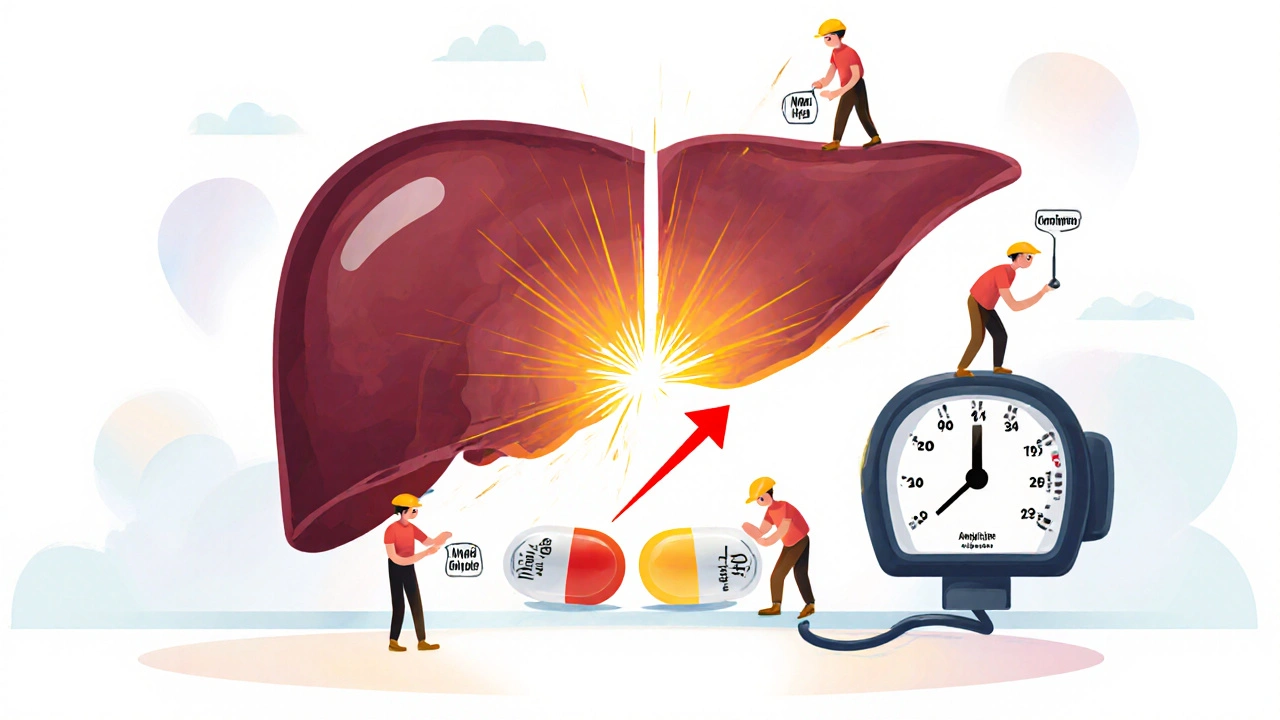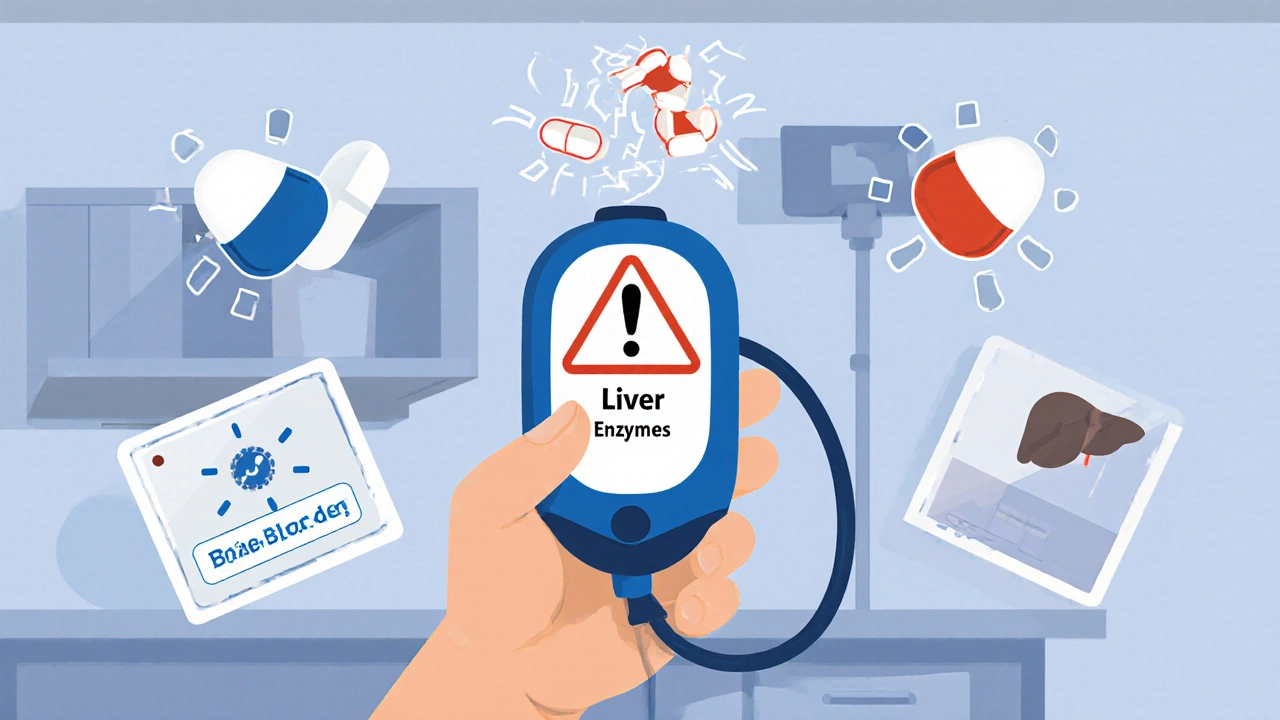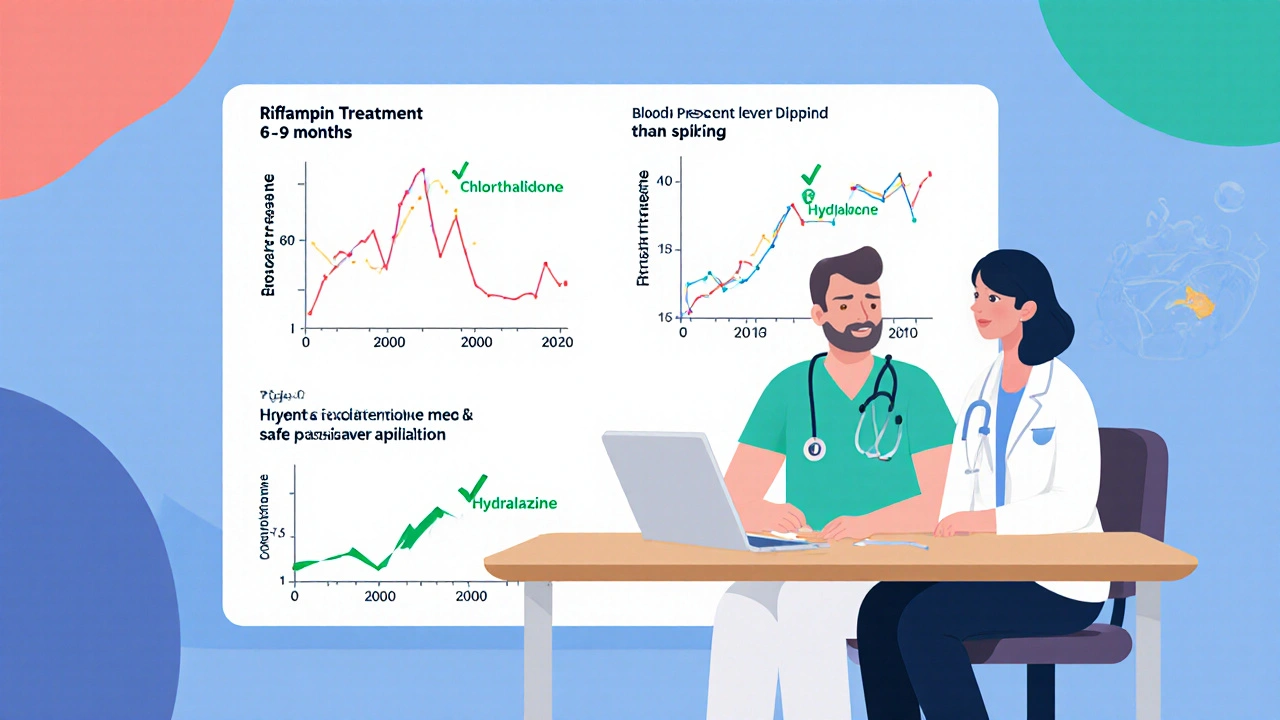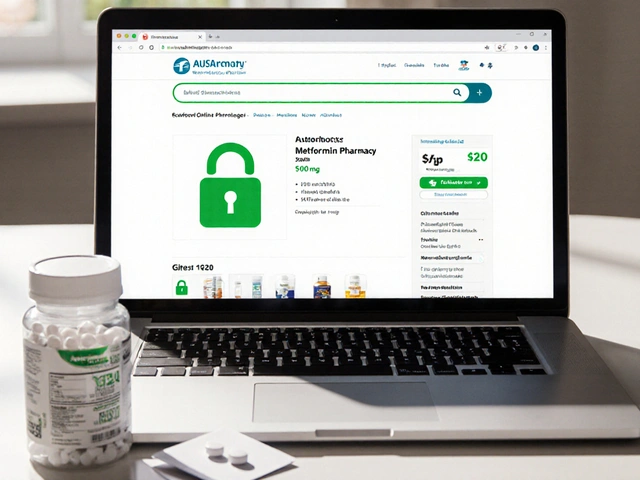
When you're taking rifampin for tuberculosis or another bacterial infection, you might not think about your blood pressure. But this powerful antibiotic can quietly affect how your body handles other medications-including those meant to control high blood pressure. If you're on blood pressure meds and your doctor prescribes rifampin, you need to understand what’s really going on inside your body.
How Rifampin Works
Rifampin is an antibiotic that kills bacteria by blocking their ability to make RNA, which they need to survive and multiply. It’s used for tuberculosis, leprosy, and sometimes to prevent meningitis in people exposed to the disease. It’s not a typical antibiotic like amoxicillin. Rifampin is strong, fast-acting, and it doesn’t just stay in your gut-it gets absorbed into your bloodstream and travels everywhere.
One of its most powerful side effects isn’t nausea or dizziness-it’s how it speeds up your liver’s ability to break down other drugs. This is called enzyme induction. Rifampin turns on liver enzymes, especially CYP3A4 and CYP2C9, which are like factory workers that process chemicals in your body. The more active they are, the faster your body gets rid of other medications.
What Happens to Blood Pressure Medications?
Many common blood pressure drugs are broken down by those same liver enzymes. When rifampin turns them on full blast, your blood pressure meds get flushed out of your system too quickly. That means they don’t stay in your body long enough to work properly.
Here are the most common blood pressure medications affected:
- Calcium channel blockers like amlodipine, diltiazem, and verapamil
- Angiotensin II receptor blockers like losartan and valsartan
- Some beta-blockers such as metoprolol and propranolol
- Renin inhibitors like aliskiren
Studies show that rifampin can reduce the blood levels of amlodipine by up to 50% within a week. That’s not a small drop-it’s enough to make your blood pressure spike. One 2023 clinical report followed 42 patients on amlodipine who started rifampin. Nearly 70% saw their systolic blood pressure rise by 15 mmHg or more within 10 days. Some needed emergency dose adjustments.
Why This Is Dangerous
High blood pressure doesn’t always cause symptoms. You might feel fine-even if your pressure is creeping up. But over time, uncontrolled hypertension damages your heart, kidneys, and blood vessels. If rifampin knocks your blood pressure meds out of action, you could be silently increasing your risk of stroke, heart attack, or kidney failure.
It’s not just about the medication levels. Rifampin can also cause its own mild increase in blood pressure in some people, especially those with existing heart conditions. The combination of reduced effectiveness of your antihypertensive drugs and a slight direct effect from rifampin can be a dangerous one-two punch.

What You Should Do
If you’re taking blood pressure medication and your doctor prescribes rifampin, don’t panic-but don’t ignore it either. Here’s what to do:
- Ask your doctor or pharmacist right away: "Will rifampin interfere with my blood pressure pills?" Don’t assume they know all your meds unless you tell them.
- Get your blood pressure checked within 3-5 days of starting rifampin. Use a home monitor if you have one. Write down the readings.
- Watch for signs of rising pressure: headaches, dizziness, blurred vision, chest tightness, or shortness of breath. These aren’t normal if you’ve been stable on your meds.
- Don’t adjust your dose yourself. Your doctor may need to increase your blood pressure medication, switch you to a different one, or monitor you more closely.
Some patients are switched to blood pressure drugs that aren’t affected by rifampin. For example, hydralazine and minoxidil are metabolized differently and are often safer choices during rifampin treatment. Your doctor might also consider using a diuretic like chlorthalidone, which isn’t broken down by the liver enzymes rifampin activates.
Other Drugs Rifampin Can Interfere With
Rifampin doesn’t just mess with blood pressure meds. It affects dozens of other drugs:
- Birth control pills (can lead to unintended pregnancy)
- Warfarin (increases risk of clotting or bleeding)
- Antifungals like fluconazole
- HIV medications including protease inhibitors and NNRTIs
- Statins like atorvastatin and simvastatin
- Some antidepressants and antipsychotics
This is why it’s critical to give your doctor a full list of everything you take-even over-the-counter supplements, herbal remedies, or painkillers. Many people don’t think of ibuprofen or St. John’s wort as "medications," but they can also interact.
What If You’ve Already Started Rifampin?
If you’ve already begun rifampin and haven’t talked to your doctor about your blood pressure meds, check your readings right away. If your systolic pressure is consistently above 140 mmHg (or higher than your target by 20+ points), contact your provider. Don’t wait for your next scheduled visit.
Some people feel fine even when their pressure is rising. That’s why tracking matters. A single high reading isn’t an emergency-but a pattern is. Your doctor might order a 24-hour ambulatory blood pressure monitor to see how your pressure changes throughout the day and night.

Long-Term Considerations
Rifampin treatment for tuberculosis usually lasts 6 to 9 months. That’s a long time to be at risk for uncontrolled blood pressure. If you’re on long-term rifampin, your blood pressure management needs to be part of your overall treatment plan-not an afterthought.
After you finish rifampin, your liver enzymes will slowly return to normal. It can take 2 to 4 weeks for your blood pressure meds to regain their full strength. Don’t assume you can go back to your old dose right away. Your doctor may need to reduce your blood pressure medication gradually to avoid dropping your pressure too low.
What to Bring to Your Doctor’s Appointment
Be ready with this information:
- A list of all your current medications, including doses and how often you take them
- Your recent blood pressure readings (even from a pharmacy machine)
- Any symptoms you’ve noticed since starting rifampin
- Questions about alternatives-"Is there another antibiotic I can use?" or "Is there a blood pressure pill that won’t interact?"
The goal isn’t to stop rifampin-it’s to keep it working while keeping your blood pressure safe. With the right adjustments, most people manage both conditions without problems.
Bottom Line
Rifampin is a life-saving drug for serious infections. But it’s not harmless. Its effect on liver enzymes can make your blood pressure medication less effective, sometimes without you realizing it. The key is awareness, monitoring, and communication with your care team. Don’t wait for symptoms. Check your pressure early, keep track, and speak up. Your heart will thank you.
Can rifampin raise my blood pressure directly?
Rifampin doesn’t usually cause high blood pressure on its own, but in some people-especially those with heart disease or kidney issues-it can cause a mild increase. The bigger risk is that it makes your blood pressure medications less effective, which leads to much larger spikes in pressure.
How long does it take for rifampin to affect my blood pressure meds?
Effects can start within 2-3 days, but the full impact usually shows up by day 7-10. That’s why it’s important to check your blood pressure early and often after starting rifampin.
Can I take rifampin with over-the-counter blood pressure supplements?
No. Many supplements like garlic extract, hawthorn, or CoQ10 can also affect blood pressure and may interact with rifampin or your prescription meds. Always tell your doctor about anything you’re taking-even if you think it’s "natural."
What if I miss a dose of my blood pressure pill while on rifampin?
Missing a dose is riskier when you’re on rifampin because your medication is already being cleared faster. Don’t double up on the next dose. Call your doctor or pharmacist for advice. They may suggest checking your pressure right away.
Are there any blood pressure drugs that are safe with rifampin?
Yes. Diuretics like chlorthalidone, and vasodilators like hydralazine and minoxidil, are less affected by rifampin because they’re broken down by different liver pathways. Your doctor can switch you to one of these if needed.
How do I know if rifampin is working on my infection if my blood pressure is up?
Rifampin’s effectiveness is measured by lab tests, symptoms, and imaging-not by your blood pressure. If your infection is improving (fever down, cough less, negative sputum tests), then rifampin is working. But high blood pressure still needs to be managed separately.




Herbert Lui
October 30, 2025 AT 16:10Rifampin is one of those drugs that makes you realize medicine isn’t just about killing bugs-it’s a whole damn chemical chess game. I’ve seen people on it for TB and suddenly their BP meds stop working like they’d been ghosted. No warning. No fanfare. Just a slow creep toward stroke territory. It’s wild how one molecule can unravel so much.
My uncle was on amlodipine for years-stable as a rock. Then they threw rifampin at him for latent TB and boom, his systolic jumped to 170. He thought he was just stressed. Turns out his liver was throwing a rave and his meds were the ones getting kicked out.
Doctors forget to talk about this. Pharmacists? Even worse. You gotta be your own advocate. Write it down. Track it. Don’t wait until you’re dizzy in the grocery aisle.
And don’t even get me started on how many people think ‘natural’ supplements are safe. Garlic pills? Hawthorn? They’re not harmless tea. They’re quiet accomplices in this drug dance.
Bottom line: Rifampin doesn’t care if you’re stable. It doesn’t ask permission. It just rewires your biochemistry and walks away like it’s done nothing. That’s power. And power without warning? That’s danger dressed in a white coat.
Nick Zararis
October 31, 2025 AT 16:12PLEASE, if you're on blood pressure meds, and your doctor prescribes rifampin-DO NOT WAIT! Check your BP within 72 hours! Seriously! Write it down! Use an app! Take a photo! Share it with your pharmacist! Don't assume it's 'fine' because you 'feel okay'-hypertension is a silent assassin! Your heart doesn't text you when it's in trouble! This isn't a suggestion-it's a medical imperative! Don't risk your life because someone didn't mention a drug interaction! You're not being dramatic-you're being smart!
Sara Mörtsell
November 1, 2025 AT 23:41Rhonda Gentz
November 2, 2025 AT 01:47It’s funny how we treat antibiotics like magic bullets, but forget they’re also molecular sculptors. Rifampin doesn’t just kill bacteria-it reshapes your entire internal chemistry. The liver enzymes it activates aren’t just busy-they’re overworked, overzealous, and completely oblivious to your BP pills.
I used to think meds were like a fixed recipe: take this, it works. But this? This is a living system. One change ripples through everything. It’s humbling. And terrifying.
That’s why I keep a notebook. Not just for meds, but for how I feel. Because sometimes the body tells you before the machine does. And if you’re listening? You might just catch the quiet crash before it happens.
Alexa Ara
November 3, 2025 AT 10:31Hey, if you're reading this and you're on rifampin-YOU GOT THIS. It’s a lot to manage, but you’re not alone. Many people have walked this path. Your blood pressure can be controlled, even with rifampin. It just takes awareness, tracking, and speaking up. Your doctor wants you to be safe. But they can’t read your mind. So tell them. Write down your numbers. Set reminders. You’re not being a hassle-you’re being the most important part of your own care team.
And if you’re scared? That’s okay. But don’t let fear paralyze you. Take action. One reading at a time. One conversation at a time. You’re stronger than you think.
Olan Kinsella
November 3, 2025 AT 14:14Let me tell you something. In Nigeria, we don’t have the luxury of fancy blood pressure monitors. We get one check-up a year-if we’re lucky. So when someone says 'check your BP every 3 days'-I laugh. Because how? You think everyone has a home monitor? Or a doctor who remembers your name?
And rifampin? Yeah, it’s given out like candy. TB is everywhere. But nobody tells you about the hidden bombs in your pills. We just take it. Hope for the best. Pray for the rest.
So yeah, this post is great. But it’s written for people who live in a world where healthcare is a menu. Not a miracle.
For the rest of us? We just survive.
And that’s the real tragedy.
Kat Sal
November 5, 2025 AT 08:55Okay, real talk: if you’re on rifampin and you’re not checking your BP, you’re playing Russian roulette with your heart. But here’s the good news-you can win this game. You just need to be proactive. Get a cheap monitor off Amazon. Set a daily alarm. Log it. Share it with your doc. It takes 2 minutes a day.
And if your doc doesn’t know about the interaction? Politely educate them. Bring the article. Print it. They’ll appreciate it. Most docs are overwhelmed. They need you to help them help you.
You’re not a burden. You’re a partner. And your heart? It’s worth the effort.
Rebecca Breslin
November 6, 2025 AT 00:26Actually, most of this is overblown. Rifampin’s effect on BP meds is well-documented in pharmacokinetic studies, but the clinical significance varies. The 50% drop in amlodipine? That’s peak plasma concentration-not total exposure. AUC is more telling. And many patients don’t even show BP spikes because their meds have long half-lives or they’re on combination therapy.
Also, hydralazine? It’s not 'safe'-it causes lupus-like syndrome in 20% of long-term users. Minoxidil? Hirsutism, fluid retention, reflex tachycardia. Chlorthalidone? Electrolyte chaos.
Just because a drug isn’t metabolized by CYP3A4 doesn’t mean it’s better. It’s just different risk. This post reads like fearmongering with footnotes.
Kierstead January
November 6, 2025 AT 15:00Of course this happens. Americans are so lazy they think a pill is a cure-all. You don’t take care of your body? Fine. But don’t blame the drug when your liver turns into a drug-disposal unit.
And why are you on blood pressure meds in the first place? Probably because you eat fast food, sit on your butt, and drink soda. Rifampin didn’t cause your hypertension-it exposed your lifestyle. You need a doctor? No. You need a mirror.
Also, why are you even taking rifampin? Did you get TB because you ignored your health? Maybe you should’ve thought about this before you got sick.
Imogen Levermore
November 7, 2025 AT 21:33